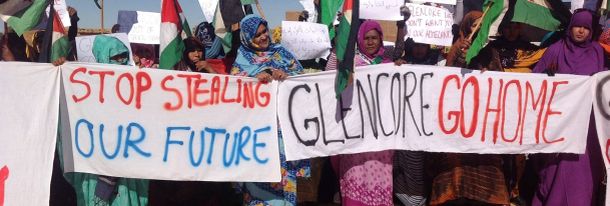WSRW confronts Glencore again on Western Saharan oil involvement

In a letter sent to the company today, WSRW has repeated its concerns about Swiss company Glencore Plc's stake in the unethical oil exploration in occupied Western Sahara. Read the full letter, and our correspondence with Glencore, here.
Published 03 February 2015
"We invite you to clarify how Glencore’s interests in Western Sahara align with the Company’s own Human Rights Policy and with the fundamental freedoms and human rights of the Saharawi people, first and foremost with their right to self-determination as understood in international law. In particular, we invite Glencore to explain what steps it has taken, if any, to make sure that the licence was signed in accordance of the wishes of the Saharawi people", WSRW today wrote to Glencore's CEO, Mr Ivan Glasenberg.
In October 2014, WSRW reported that Glencore Plc had been awarded two oil licenses by the Moroccan government for oil Blocks that are located offshore occupied Western Sahara. WSRW first contacted Glencore on 18 December 2014, urging the company to withdraw from the territory to help create the necessary conditions to allow the Saharawi people to determine the status and governance of their own country. Glencore's reply to WSRW, dated 24 December 2014, citing Morocco's "positive" approach to the peace process, can be found here.
Ivan Glasenberg
Chief Executive Officer
Glencore International AG
Brussels
3 February 2015
RE: Petroleum exploration in occupied Western Sahara
Dear Mr Glasenberg,
Thank you for your reply of 24 December 2014 to our letter of 18 December 2014. The fact that you made the effort to get back to us on Christmas Eve demonstrates that you take the matter seriously, for which we are grateful.
However, the content of your response is reason for concern, as it seemingly disregards a fundamental human right: the right to self-determination, as guaranteed by the International Court of Justice, the International Covenant on Economic, Social and Cultural Rights and customary international law. Taking the Saharawi people’s right to self-determination as a point of departure, the UN Legal Counsel concluded in 2002 that the rights and the wishes of that people are paramount in assessing the legality of the exploration or exploitation activity. That implies free, informed and prior consultation, consent and subsequent benefit.
It is not clear from your letter how Glencore has sought the consent of the Saharawi people, living under Moroccan occupation and in Algerian refugee camps.
With regard to its Human Rights Policy, Glencore’s website states: “With this policy we provide guidance and further interpretation of our fundamental commitment to respect Human Rights, consistent with the UN Universal Declaration of Human Rights. As stipulated in our Code of Conduct, we uphold the dignity, fundamental freedoms and human rights of our employees, contractors and the communities in which we live and work and others affected by our activities”.
We invite you to clarify how Glencore’s interests in Western Sahara align with the Company’s own Human Rights Policy and with the fundamental freedoms and human rights of the Saharawi people, first and foremost with their right to self-determination as understood in international law. In particular, we invite Glencore to explain what steps it has taken, if any, to make sure that the licence was signed in accordance of the wishes of the Saharawi people.
We repeat our call for immediate termination of Glencore’s involvement in occupied Western Sahara, thereby contributing to the serenity and good-faith that is vitally needed for the fulfillment of the human rights, in particular the right to self-determination, of the people of Western Sahara.
Sincerely,
Erik Hagen
Chair
Western Sahara Resource Watch
A copy of this letter was sent to:
- HE Ambassador Christopher Ross, UN Secretary-General’s Personal Envoy for Western Sahara
- HE Kim Bolduc, UN Secretary-General’s Special Representative for Western Sahara and Head of the United Nations Mission for the Referendum in Western Sahara (MINURSO)
- Ms Ursula Wynhoven, General Counsel at UN Global Compact
- Ms Liliane Maury Pasquier, Member of the Swiss Parliament
- Mr Alfred Fritschi, Managing Director of The Berne Declaration
- Ms Caroline Morel, Director of Swiss Aid
News
Glencore has left occupied Western Sahara
The final assets that Glencore held in oil exploration in occupied Western Sahara have been sold.
23 January 2018
Glencore is departing Western Sahara
The biggest international company currently present in occupied Western Sahara is ending its operations in the territory, according to Swiss media.
11 May 2017
Norwegian investor blacklists Glencore for Western Sahara oil search
The Norwegian investor KLP today announced it is ditching Swiss multinational Glencore for violating fundamental ethical norms in occupied Western Sahara.
08 December 2015
243 organisations ask UN to condemn Morocco's colonial oil plans
"No oil drilling should take place in the territory until the Saharawis have had the chance to exercise their right to self-determination and have freely and fairly decided the political status of their homeland", the appeal to the Security Council writes. Read the full letter, and list of signatures, here.
15 April 2015


